srImathE rAmAnujAya nama:
srImadh varavaramunayE nama:
srI vAnAchala mahAmunayE nama:
In the previous article (https://granthams.koyil.org/2013/07/anthimopaya-nishtai-17/),
we observed the glories of srIvaishNavas through the words of emperumAn, pirAtti, AzhwArs and
AchAryas. We also observed the unconditional kindness shown by sIthA
pirAtti and mAmunigaL towards the ones who troubled them. We will now
see the concluding section of this divine grantham.
Thus, as said in “sthAvarANyapi muchyanthE” (ஸ்தாவராண்யபி முச்யந்தே – Even plants are liberated by the touch of vaishNava) and “pasur manushya: pakshI vA” (பசுர் மநுஷ்ய: பக்ஷீ வா
– animals, humans and birds – all are liberated by establishing a
connection with a vaishNava) our pUrvAchAryas surrendered to their
AchAryas who are focussed on uplifting the entire world and are most
merciful. Our pUrvAchAryas are all knowing, the leaders among the
scholars who can distinguish between the essence and the extraneous
principles, the ones who have completed all their responsibilities (by
taking shelter of sadhAchAryas) and always focussed on mangaLAsAsanam
(praying for the well-being of bhagavAn and bhAgavathas). As said (by
ANdAL in nAchiyAr thirumozhi) “nAnum piRanthamai poyyanRE” (நானும் பிறந்தமை பொய்யன்றே – nAchiyAr thirumozhi 10.4 – If emperumAn does not come and see me, me being the daughter of periyAzhwAr is not worth it) and “vallaparisu varuvipparEl athu kANdumE (வல்லபரிசு வருவிப்பரேல் அது காண்டுமே – nAchiyAr
thirumozhi 10.10 – if periyAzhwAr makes emperumAn come, I will see him)
they have learnt the blemishless path of surrendering unto
srIvaishNavas who are always glorifying emperumAn. Then, with full
knowledge without any doubt, they will focus on such AchAryas as the
most apt object of worship/service and feel that they are burdenless and
are resting in cool breeze in hot summer. They are free from anxiety
about the ultimate goal as said in “siRRa vENdA” (சிற்ற வேண்டா – thiruvAimozhi 9.1.7 – no need to worry) and by holding on to the guru paramparai and stay as said in dhEvu maRRaRiyEn (தேவு மற்றறியேன் – kaNNinuN chiruthAmbu 2 – I know no other god than nammAzhwAr). Such noble qualities are seen in:
- periyAzhwAr‘s divine daughter ANdAL towards his father/AchArya
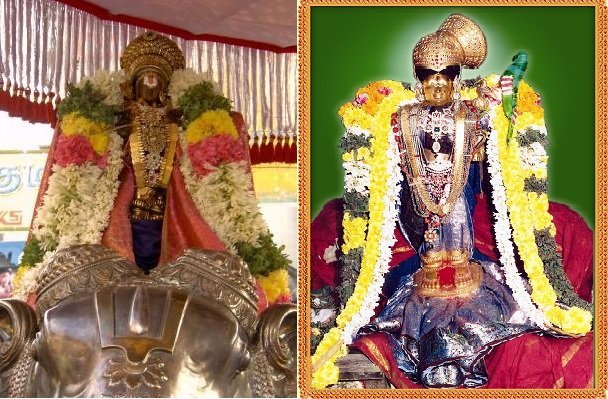
- madhurakavi AzhwAr at the lotus feet of nammAzhwAr
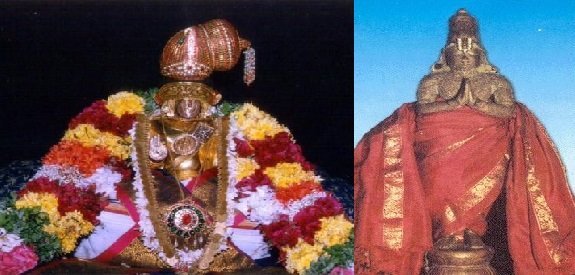
- vaduga nambi at the lotus feet of emperumAnAr

- kUra kulOththama dhAsar at the lotus feet of vadakku thiruvIdhi piLLai and piLLai lOkAchAryar
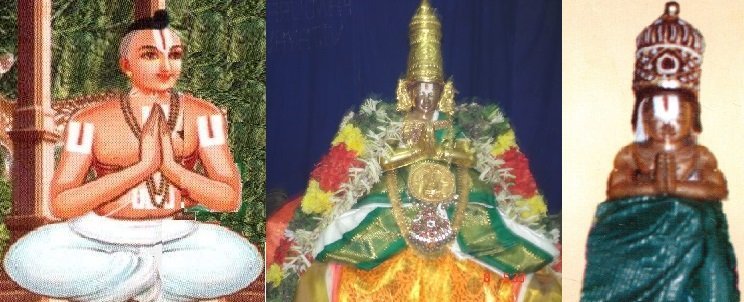
- Our jIyar (mAmunigaL) at the lotus feet of thiruvAimozhi piLLai and maNalpAkkathu nambi
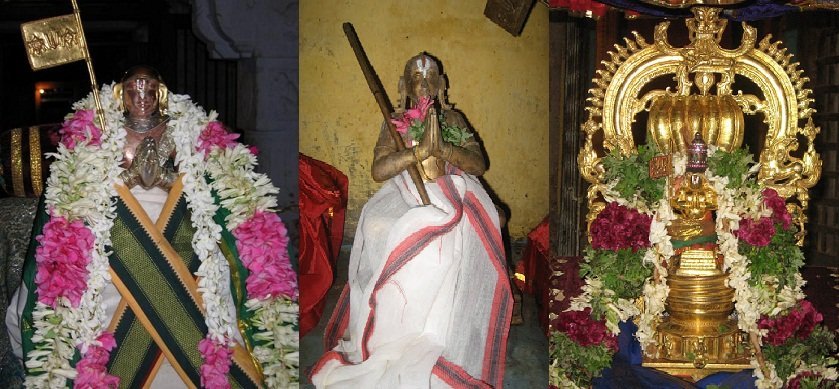
are many srIvaishNavas with such great AchArya nishtai at the lotus
feet of our jIyar (mAmunigaL). Even today (in the times of paravasthu
pattarpirAn jIyar) we can observe these amongst the relationships where
both AchAryas and sishyas are fully qualified. Even in the future, as
long as rAmAnuja sidhAntham is blossoming, as said in “kaliyum kedum kaNdu koNmin” (கலியும் கெடும் கண்டு கொண்மின்
– ill-effects of kali will be destroyed), there will be qualified
personalities forever. For such personalities, even if they casually
speak some words, those will become most auspicious. All their divine
words will reveal the meanings of thirumanthram which is the essence of
all of vEdhAntham.
வேத சாஸ்த்ராரூடா: ஜ்ஞாநகட்கதராத்விஜா:
க்ரீடார்த்தமபி யத் ப்ரூயுஸ்ஸ தர்ம: பரமோ மத:
translation: What is said even playfully by the twice born, who are reposed in the principles of the Vedic scriptures and are experts in disseminating the knowledge of the same, becomes the righteous and exalted opinion.
adhiganthavyAssanthO yadhyapi kurvanthi naikamupadhEsam
yAsthEshAm svairakathAsthA Eva bhavanthi sAsthrArththA:
அதிகந்தவ்யாஸ்ஸந்தோ யத்யபி குர்வந்தி நைகமுபதேசம்
யாஸ்தேஷாம் ஸ்வைரகதாஸ்தா ஏவ பவந்தி சாஸ்த்ரார்த்தா:
Simple translation: Not only the teachings of noble men, but also their actions are to be studied carefully. (This is because) What constitutes their personal discipline is verily the purport of the scriptures.
gyAna sAram 40
alli malar pAvaikkanbar adikkanbar
sollum avidu suruthiyAm
nalla padiyAm manu nURkavar saridhai
pArvai sediyAr vinaith thogaikkuth thI
அல்லி மலர் பாவைக்கன்பர் அடிக்கன்பர்
சொல்லும் அவிடு சுருதியாம்
நல்ல படியாம் மனு நூற்கவர் சரிதை
பார்வை செடியார் வினைத் தொகைக்குத் தீ
Simple
translation: Those who are attached to the lotus feet of husband of srI mahAlakshmi, their words are as good as vEdham itself, their life is
the source for manu smruthi and their vision is the destroyer of all the
sins.
thadhukthimAthram manthrAgryam
ததுக்திமாத்ரம் மந்த்ராக்ர்யம்
Simple translation: Words spoken by him
make up the best manthram
Since
such devotees are known to not speak anything useless even
forgetfully, all their divine words will reflect the meanings of
thirumanthram which is the essence of all of vEdhAntham.
As
said in the following slOkam, thirumanthram contains all the essential
principles of all pramANams and all that is to be known.
ruchO yajumshi sAmAni thathaivatharvaNAni cha
sarvamashtAksharAnthastham yachchAnyadhapi vAngmayam
ருசோ யஜும்ஷி ஸாமாநி ததைவதர்வணாநி ச
ஸர்வமஷ்டாக்ஷராந்தஸ்தம் யச்சாந்யதபி வாங்க்மயம்
Simple
translation: The meanings of rig, yajur, sAma, atharvaNa vEdhams,
vEdhAntham, ithihAsams, purANams, smruthis, etc., are all contained in
this ashtAkshara mahAmanthram.
Such
glorious thirumanthram explains 3 important principles through the 3
padhams (words) – aum (sEshathvam – servitorship), nama:
(pArathanthriyam – total dependence) and nArAyaNAya (kainkaryam –
uninterrupted service to the sole pleasure of bhagavAn alone). These
principles applies towards bhagavAn partially and towards bhAgavathas
fully. This is why, our pUrvAchAryas, understanding this epitome of
essential principles, explained the same in samskrutha, dhrAvida,
maNipravALa texts in unison (unanimously). A sishsya should constantly
mediate and be situated in the ultimate nishtai of AchArya abhimAnam
(mercy/affection of AchArya) and always consider his AchAryan as the
master, refuge, object of enjoyment and all types of relation to oneself
(ALavandhAr‘s sthOthra rathnam 5: mAthA pithA yuvathaya: [மாதா பிதா யுவதய:] – nammAzhwAr is mother, father, wife, children, etc., for us, madhurakavi AzhwAr‘s kaNNinuN chiru thAmbu 4: annaiyAy aththanAy [அன்னையாய் அத்தனாய்] – nammAzhwAr is my mother and father, mAmunigaL‘s Arthi prabhandham 3: thanthai
naRRAy thAram thanayar perumchelvam enRanakku nIyE ethirAsA [தந்தை
நற்றாய் தாரம் தனயர் பெரும்செல்வம் என்றனக்கு நீயே எதிராசா] – yathirAja! my dear father! you are my father, mother, wife, wealth, etc) as identified in:
- kaNNinuN chiru thAmbu 1 – thenkurugUr nambi ennakkAl aNNikkumamudhURum en nAvukkE (தென்குருகூர் நம்பி என்னக்கால் அண்ணிக்குமமுதூறும் என் நாவுக்கே) – madhurakavi AzhwAr – I taste the nectar in my tongue as soon as I say the divine names of nammAzhwAr
- kaNNinuN chiru thAmbu 2 – nAvinAl naviRRu inbameythinEn (நாவினால் நவிற்று இன்பமெய்தினேன்) – just by speaking nammAzhwAr‘s name/fame I derive great pleasure
- rAmAnusa nURRanthAdhi 102 – en nAvirunthu emmaiyan irAmAnusan enRazhaikkum (என் நாவிருந்து எம்மையன் இராமானுசன் என்றழைக்கும்) – My tongue will steadily call out your causeless divine relationship with me and your divine names
- rAmAnusa nURRanthAdhi 1 – irAmAnusan
charaNAravintham nAm manni vAzha nenjE solluvOm avan nAmangaLE
(இராமானுசன் சரணாரவிந்தம் நாம் மன்னி வாழ நெஞ்சே சொல்லுவோம் அவன் நாமங்களே) – Dear heart! Let us recite the many divine names of srI rAmAnuja to live a life that is situated fully at his lotus feet
- rAmAnusa
nURRanthAdhi thanian – un nAmamellAm enRan nAvinuLLE allum pagalum
amarumpadi nalgu aRusamaya vellum parama irAmAnusa (உன் நாமமெல்லாம்
என்றன் நாவினுள்ளே அல்லும் பகலும் அமரும்படி நல்கு அறுசமய வெல்லும் பரம
இராமானுச) – Oh rAmAnuja who won over six philosophical systems and
established vEdhAntha principles! You ensure that your divine names are
situated in my tongue always
- gurOrvArthAscha kathayEth – gurOr nAma sadhA jabEth (குரோர்வார்தாச்ச கதயேத் – குரோர் நாம ஸதா ஜபேத்) – Always discuss the words/instructions of AchAryan, always recite the names of AchArya
- should constantly meditate on the first surrender to AchArya and have that “nama:” as the manthram (Translator’s
note: japthavyam guruparamparaiyum dhvayamum says piLLai lOkAchAryar –
here asmadh gurubhyO nama: … srIdharAya nama: is considered
as the first manthram to recite before reciting dhvaya mahA manthram)
- should consider AchArya as the Supreme Lord himself as mentioned in:
-
- gururEva param brahma (குருரேவ பரம் ப்ரஹ்ம) – guru is the Supreme Lord
-
- gyAna sAram 38 – thEnAr kamalath thirumAmagaL kozhunan thAnE guruvAgi (தேனார் கமலத் திருமாமகள் கொழுநன் தானே குருவாகி) – The husband of srI mahAlakshmi himself becomes the AchAryan
-
- yasya sAkshAth bhagavathi gyAnadhIpapradhE gurau (யஸ்ய ஸாக்ஷாத் பகவதி ஜ்ஞாநதீபப்ரதே குரௌ) – Since AchArya enlightens the sishya with the torch of knowledge, he should be considered as bhagavAn himself
-
- pIthagavAdaippirAnAr biramaguruvAy vanthu (பீதகவாடைப்பிரானார் பிரமகுருவாய் வந்து) – bhagavAn himself appears as the first guru
- should consider AchArya’s residence as the ultimate abode – paramapadham itself as stated in
-
- yEnaiva
guruNA yasya nyAsavidhyA pradhIyathE; thasya vaikuNtadhugdhAbdhi
dhvArakAs sarva Eva sa: (யேநைவ குருணா யஸ்ய ந்யாஸவித்யா ப்ரதீயதே; தஸ்ய
வைகுண்டதுக்தாப்தி த்வாரகாஸ் ஸர்வ ஏவ ஸ:) – Wherever that AchAryan who
imbibed the knowledge about sharaNAgathi lives, for the sishya, that place
itself is srIvaikuntam, kshIrAbdhi and all other divine abodes of
bhagavAn.
- yEnaiva
-
- gyAna sAram 36 – villAr
maNi kozhikkum vEngadap poR kunRu mudhal sollAr pozhil sUzh
thiruppathigaL ellAm maruLAm iruLOda maththagaththuth than thAL aruLAlE
vaiththa avar (வில்லார் மணி கொழிக்கும் வேங்கடப் பொற் குன்று முதல்
சொல்லார் பொழில் சூழ் திருப்பதிகள் எல்லாம் மருளாம் இருளோட மத்தகத்துத் தன்
தாள் அருளாலே வைத்த அவர்) – For a true sishyan, all residing places
of bhagavAn starting with thiruvEnkatam (and also paramapadham,
kshIrAbdhi, etc) are to be seen in his own AchAryan who removed the
ignorance of the sishyan by his causeless mercy.
- gyAna sAram 36 – villAr
-
- kaNNinuN chiru thAmbu 11 – nambuvAr pathi vaikuntham kANminE (நம்புவார் பதி வைகுந்தம்) – One who believes in the divine words of madhurakavi AzhwAr, wherever they stay that place becomes vaikutham
- should consider AchAryan’s lotus feet as the means and end as said in:
-
- AzhwAn‘s slOkam glorifying emperumAnAr – yOnithyam … rAmAnujasya charaNau sharaNam prapadhyE (யோநித்யம் … ராமாநுஜஸ்ய சரணௌ சரணம் ப்ரபத்யே) – Always consider srI rAmAnuja‘s lotus feet as our only refuge
-
- rAmAnusa nURRanthAdhi 45 – pERonRu
maRRillai nin charaNanRi, appEraLiththaRku ARonRum illai maRRach
charaNanRi (பேறொன்று மற்றில்லை நின் சரணன்றி, அப்பேறளித்தற்கு ஆறொன்றும்
இல்லை மற்றச் சரணன்றி) – amudhanAr towards emperumAnAr – My goal of
life is to serve your lotus feet and to have that accomplished your
lotus feet are the only path
- rAmAnusa nURRanthAdhi 45 – pERonRu
-
- upAya upEya bhAvEna thamEva sharaNam vrajEth (உபாய உபேய பாவேந தமேவ சரணம் வ்ரஜேத்) – Surrender unto the lotus feet of AchAryan as upAyam/means and upEyam/goal
- should consider service to AchAryan’s lotus feet by mind, speech and hands as the ultimate goal as stated in:
-
- sundharabAhu sthavam 129 – rAmAnujArya vachaka: parivarththishIya (ராமாநுஜார்ய வசக: பரிவர்த்திஷீய) – AzhwAn requesting sundhara bAhu emperumAn to reunite him with his AchAryan to serve him in srIrangam
-
- yathirAja vimsathi 4 –
nithyam yathIndhra thava dhivya vapusmruthaumE saktham manObavathu vAk
guNakIrthanEsau; kruthyancha dhAsyakaraNanthu karadhvayasya
vruththyantharEsthu vimukam karaNa thrayam cha (நித்யம் யதீந்த்ர தவ
திவ்ய வபுஸ்ம்ருதௌமே ஸக்தம் மநோபவது வாக் குணகீர்தநேஸௌ; க்ருத்யஞ்ச
தாஸ்யகரணந்து கரத்வயஸ்ய வ்ருத்த்யந்தரேஸ்து விமுகம் கரண த்ரயம் ச) –
mAmunigaL to srI rAmAnuja – Oh yathIndhra! Let my mind be fixated on
your beautiful form; let my mouth sing your name and glories; let my
hands serve you; let these not think of anything else.
- yathirAja vimsathi 4 –
-
- srIvachana bhUshaNam 299 – sakthikkilakku AchArya kainkaryam (சக்திக்கிலக்கு ஆசார்ய கைங்கர்யம்) – sishyas capabilities should be focussed/spent on performing service to AchAryan
- should consider the happiness on AchAryan’s face on seeing sishya’s kainkarya as the biggest result as stated in:
-
- srIvachana bhUshaNam 321 – sishyan
enbathu sAdhyAnthara nivruththiyum pala sAdhana susrushaiyum (சிஷ்யன்
என்பது ஸாத்யாந்தர நிவ்ருத்தியும் பல ஸாதந சுச்ருஷையும்) – True sishya
means one who considers only AchAryan as the ultimate goal and
performing service to AchAryan to please him always.
- srIvachana bhUshaNam 321 – sishyan
adhikAris (qualified sishyas) who are fully situated in AchArya
nishtai, can give up all sensual pleasures and materialistic
aspirations. They can relish the divine auspicious form of AchAryan as
said in “sadhA pasyanthi” (ஸதா பச்யந்தி – In paramapadham jIvAthmAs
are blissful by constantly having the vision of bhagavAn). Further, they
can serve their AchAryan in both this world and paramapadham as said in
“athra parathra chApi” (அத்ர பரத்ர சாபி – sthOthra rathnam 2) along with like minded
devotees in paramapadham (which is the abode of endless bliss) and be
submerged in an ocean of nectarean joy and perform mangaLAsAsanam
forever.
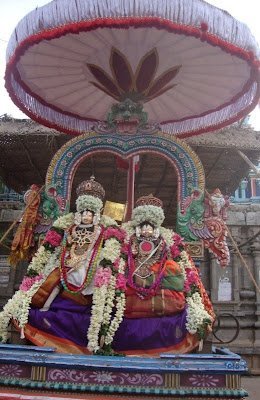
We can constantly remember the following divine srIsUkthis as pramANam (valid proof) for anthimOpAya (AchArya) nishtai.
- rAmAnusa nURRanthAdhi 104 – kaiyil
kaniyanna kaNNanaik kAttith tharilum unRan meyyil piRangiya chIranRi
vENdilan yAn (கையில் கனியன்ன கண்ணனைக் காட்டித் தரிலும் உன்றன் மெய்யில்
பிறங்கிய சீரன்றி வேண்டிலன் யான்) – Even if you show me kaNNan emperumAn (who is well known for his beauty and accessibility for his
devotees), I will only focus on your divine form and qualities and need
nothing else
- kaNNinuN chiru thAmbu 2 – nAvinAl naviRRu inbameythinEn (நாவினால் நவிற்று இன்பமெய்தினேன்) – Spoke the glories of nammAzhwAr and became blissful
- nAchiyAr thirumozhi 10.10 – nallaven
thOzhi … vittuchiththar thangaL dhEvarai vallaparisu varuvipparEl
athu kANdumE (நல்லவென் தோழி … விட்டுசித்தர் தங்கள் தேவரை வல்லபரிசு
வருவிப்பரேல் அது காண்டுமே) – ANdAL says – If periyAzhwAr invites kaNNan and makes him come some how, I will see him at that time
- paramAchAryar ALavandhAr explained this principle in the “mAthA pithA yuva thaya:” (மாதா பிதா யுவதய:)
slOkam towards nammAzhwAr. He established that nammAzhwAr is the
vaishNava kula pathi (leader of the vaishNavas) and nammAzhwAr is
everything for him
- pasur manushya pakshIvA (பசுர் மநுஷ்ய பக்ஷீவா)
slOkam – An animal, human or bird – irrespective of the birth (whether
that qualifies for pursuance of knowledge through sAsthram or not), the
connection with a vaishNava will deliver to parampadham easily
- bAla mUka jata anthAscha (பால மூக ஜட அந்தாச்ச)
slOkam – Child, deaf, dumb, blind, lame, etc., when taken shelter of a
true AchArya, they are sure to reach the ultimate destination of
paramapadham
- AchAryasya
prasAdhEna mama sarvamabIpsitham; prApnuyAmIthi visvAsO yasyAsthi sa
sukI bhavEth (ஆசார்யஸ்ய ப்ரஸாதேந மம ஸர்வமபீப்ஸிதம்; ப்ராப்நுயாமீதி
விச்வாஸோ யஸ்யாஸ்தி ஸ ஸுகீ பவேத்) – One who has the confidence/faith that he will attain all his desires by the grace of his AchAryan, shall be happy
- periyavAchAn piLLai‘s divine words in mANikkamAlai – ihalOkaparalOkangaLiraNdum
AchAryan thiruvadigaLE enRum, dhrushtAdhrushtangaLiraNdum avanE enRum
visvasiththirukkiRathukku mElillai (இஹலோகபரலோகங்களிரண்டும் ஆசார்யன்
திருவடிகளே என்றும், த்ருஷ்டாத்ருஷ்டங்களிரண்டும் அவனே என்றும் விச்வஸித்திருக்கிறதுக்கு மேலில்லை) –
There is nothing higher than considering everything in this world and
paramapadham as the lotus feet of AchArya and considering the visible
benefits and invisible benefits as AchAryan himself.
- piLLai lOkAchAryar‘s divine srIsUkthi in srIvachana bhUshaNa dhivya sAsthram 322 – manthramum,
dhEvathaiyum, palamum, palAnubandhigaLum, palasAdhanamum, aihikabOgamum
ellAm AchAryanE enRu ninaikkak kadavan (மந்த்ரமும், தேவதையும், பலமும்,
பலாநுபந்திகளும், பலஸாதநமும், ஐஹிகபோகமும் எல்லாம் ஆசார்யனே என்று
நினைக்கக் கடவன்) – A sishya should consider his own AchAryan as
-
- manthram – that which he recites and that which relieves him from the misery of samsAram
-
- para dhEvathai – bhagavAn – who is the object of that manthram
-
- palam – result in the form of kainkaryam which is blessed by bhagavAn
-
- palAnubandhi – ancillary benefits such as full self realisation and living in paramapadham, etc.
-
- pala sAdhanam – the means by which the benefits are accomplished
-
- aihikabOgam – any other sensual pleasures one may aspire for in this world before leaving to paramapadham
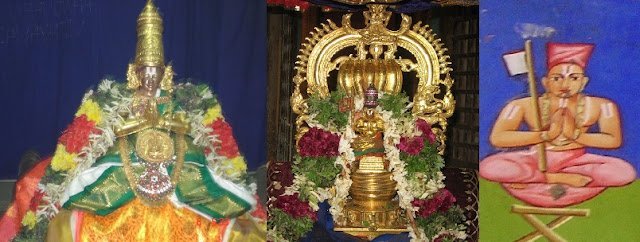
srI saumyajAmAthrumunE: prasAdhapbAva sAkshAthkrutha sarvathathvam
agyAnathAmisra sahasrabAnum srIbattanAtham munimAsrayAmi
ஸ்ரீ ஸௌம்யஜாமாத்ருமுநே: ப்ரஸாதபாவ ஸாக்ஷாத்க்ருத ஸர்வதத்வம்
அஜ்ஞாநதாமிஸ்ர ஸஹஸ்ரபாநும் ஸ்ரீபட்டநாதம் முநிமாச்ரயாமி
Simple
translation: I take refuge in srI bhattanAtha muni, who saw the truths as they are by the grace of srI saumyajAmathru muni and who is the Sun of thousand rays that dispels the darkness of ignorance.
Thus ends the translation of paravasthu pattarpirAn jIyar’s anthimOpAya nishtai.
Translator’s notes:
- Thus we have seen the full glories of AchArya nishtai in this concluding section.
- Thanks to srI ranganAthan swamy for providing translations for some samskritha pramANams.
Full series can be viewed at: https://granthams.koyil.org/anthimopaya-nishtai-english/.
adiyen sarathy ramanuja dasan
archived in https://granthams.koyil.org, also visit https://acharyas.koyil.org.
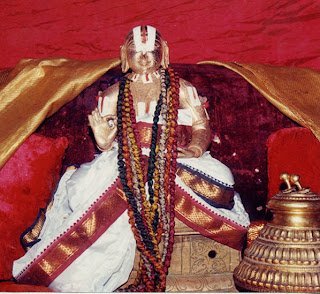
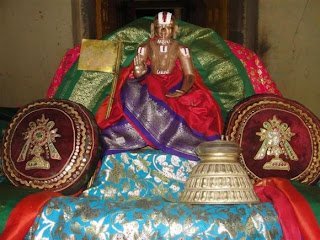
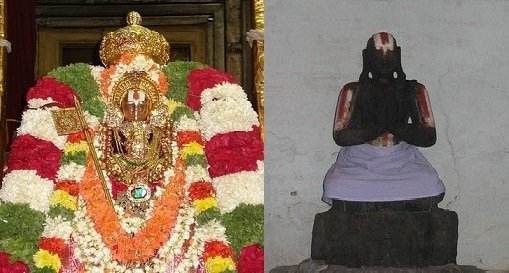
In thamizh – https://granthams.koyil.org/2019/08/14/anthimopaya-nishtai-18-tamil/
In telugu – https://granthams.koyil.org/2022/10/06/anthimopaya-nishtai-18/
Adiyen ramanuja dasi. Thankyou for your huge efforts in bringing this gem of a book accessible for a naive sishya like me, who is searching every nook and corner of the internet, for actual real scenarios in our sampradayam where sishyas beautifully served their Acharyas in charama parva nista. Dasoham.
-Sishya of Sri Sri Sri Tridandi SriRanga Ramanuja Jeeyar Swamiji. Kakinada. Andhra Pradesh.
Happy to hear about your feedback.
adiyen ramanuja dasan